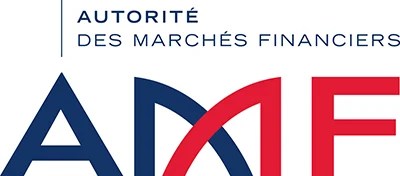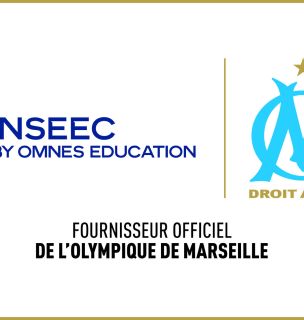Financial Expertise creates value
Ellen KOUNTZ
Program director
Why choose the MSc in Investment Banking & Financial Engineering program ?
The goal of this program is to train professionals specializing in corporate finance, with a particular focus on capital structure transactions. The curriculum is organized into three main areas: Financial Analysis, Financial Engineering, and Investment Banking. Through this training, students will learn to master the financial, legal, and tax aspects of financing operations, enabling them to design and implement financial arrangements aligned with companies’ development objectives.
Upon completion of this program, students will be qualified for roles such as: Mergers & Acquisitions Analyst, Financing Manager, Corporate Account Manager, Credit Analyst, and Financial Manager.
Professional label

Les étudiants INSEEC passent la certification AMF (Autorité des Marchés Financiers) dans le cadre de leur MSc Banque d’Affaires & Ingénierie Financière.

A diploma completed in 1 or 2 years to become an expert in Financial Analysis
- Volume horaire 1ère année de MSc : 441 heures
- Volume horaire 2ème année de MSc : 441 heures
Certification objectives
The skill objectives are to be able to :
- Analyze the company’s strategic data ;
- Monitor and manage the company’s operations ;
- Ensure the sustainability of the company’s activities ;
- Provide financial recommendations and effectively manage communication.
How to apply to the MSc Investment Banking & Financial Engineering at INSEEC ?
The required prerequisites
The conditions for accessing the certification system (excluding VAE) are:
- For admission into the 4th year (MSc1) : hold a Level 6 qualification and have validated the equivalent of 180 ECTS credits in a curriculum equivalent to the relevant field.
- For admission into the 5th year (MSc2) : hold a Level 6 qualification and have validated the equivalent of 240 ECTS credits in a curriculum equivalent to the relevant field.
Want to know more about the MSc in Investment Banking & Financial Engineering ?
Sign up for an Open Day!
Would you like to know more about the admission conditions for our programme in Banking & Financial Engineering ?
What are the courses in the Master of Science in Investment Banking & Financial Engineering ?
The courses presented below are examples and may vary slightly depending on the teaching campus. The course content is adapted each year to market developments and updated before each academic term.
1st year courses
TRANSVERSAL & FUNDAMENTAL COURSES
BUDGET MANAGEMENT & DASHBOARDS
The objective is to acquire key skills in budget management and reporting. The focus will be on budget architecture, including the preparation of summary documents, project management control and its connection to budget management, as well as the creation and monitoring of dashboards.
BUSINESS STRATEGIES & BUSINESS PLAN
This module aims to teach how to create a Business Plan: a detailed financial project for starting or developing a business.
Several steps are covered :
- Feasibility study
- Market targeting
- Opportunities and risks
- Strengths and weaknesses
- Communication
- Financing plan and profitability
BUSINESS ENGLISH
Refine comprehension and communication skills in English within a broader context beyond just business English.
SOFTWARE & DECISION-SUPPORT TOOLS
This module aims to deepen students’ IT skills to meet business demands in budget and sales tracking, project management, personnel management, and communication: including Excel, Word, PowerPoint, teamwork tools, and industry-specific software. It focuses on proficiency with office tools, quickly identifying and correcting errors, customizing existing tools, or creating new ones.
BUSINESS GAME
The business simulation is conducted using a management simulator. Groups of students are responsible for running a company in real time. All major business functions are covered. Students make decisions aimed at maximizing the company’s profitability.
PROFESSIONAL TOOLS & METHODS
This module helps learners improve their CV and professional demeanor through practical exercises such as role-playing, professional simulations, public speaking, and more :
- Des ateliers pratiques et professionnalisants (CV, réseaux sociaux professionnels, coaching, etc.)
- Ainsi que des conférences métiers et master class.
SPECIALIZED COURSES
ACCOUNTING
The purpose of general accounting is to explain its “reasons for being,” main uses, documents, and mechanisms, including :
- The purpose, content, and use of an organization’s Balance Sheet and Income Statement.
- The mechanisms that link these two financial statements.
- The accounting recording of the company’s main transactions.
This introductory general accounting module’s main objective is to provide every student, regardless of their career plans, with a basic accounting knowledge to understand financial statements and use this understanding to communicate effectively with accountants.
FUNDAMENTALS OF FINANCIAL ANALYSIS
- Modern tools for financial diagnosis to conduct a comprehensive analysis of the company.
- Tools to assist in financial diagnosis: analysis of profitability, solvency, and the company’s financial structure.
- Study of profitability.
MANAGEMENT CONTROL
- Calculation of the break-even point and payback period.
- Techniques in budget management, activity monitoring, and dashboards.
- Analysis and use of management control, cost calculation methods, analysis center methods, rational allocation of fixed costs, marginal cost, and partial costs.
INTERNAL AUDIT
- Evaluation of operations and the company’s level of control.
- Providing advice and studying tools to contribute to value creation.
- Evolution of the auditor’s role.
AUDIT & STATUTORY AUDITING
- The seminar covers financial audit missions as well as audit procedures, tests, methods, and tools.
- It presents statutory auditing, general aspects, and the implementation of the audit, assessment of internal control, specific verifications, and final mission reports.
- Topics include analytical procedures, physical controls, and management declarations.
ADVANCED ACCOUNTING
- Mastery of accounting procedures.
- Consolidation of accounts.
- Allocation of profits.
- Capital reduction.
- Valuation of securities.
- Company formation.
- Capital increase.
- Convergence of the French Accounting Plan (PCG) towards IFRS standards.
ADVANCED FINANCIAL ANALYSIS
Mastery of fundamental concepts for preparing financial forecasts. Sources of information, sector analysis, analysis of economic and financial performance, analysis of financial structure, and financing methods.
BUSINESS LAW
- Definition of business law.
- The concept of a contract.
- Obligations of means and obligations of result.
- The concept of legal personality, and the functioning of SARL, SA, and SNC.
- Criteria for choosing a legal form of business.
INTERNATIONAL FINANCIAL STATEMENTS
- Presentation of IFRS and US GAAP frameworks.
- Comparison of financial flows over time.
- Structure of accounting standards, conceptual framework of the standards, and presentation of financial statements under IFRS/US GAAP.
- Valuation and accounting of financial instruments.
CORPORATE FINANCE
- Investment projects : selection criteria and the real options approach.
- Financing methods : quasi-equity, bond financing, negotiable debt instruments, IPOs, and venture capital.
- Theoretical frameworks explaining financing choices.
- Cash management and centralized cash flow management.
CORPORATE TAXATION
- The principles and scope of Corporate Income Tax (CIT), and tax optimization within a group.
- International taxation.
- VAT : principles and mechanisms.
- Special VAT regimes.
- Territoriality of VAT : rules governing VAT territoriality, supply of movable goods, provision of services.
- VAT liability : VAT base and its calculation.
E AMF
This hybrid module will provide an understanding of the role of the Financial Markets Authority (Autorité des Marchés Financiers – AMF) in the regulation and supervision of financial markets, covering the following topics :
- Financial instruments.
- Crypto-assets and associated risks.
- Collective investment management.
- Market organization and functioning.
- Post-trade processes and market infrastructures.
- Issuances and securities transactions.
- Accounting and financial fundamentals.
FINANCIAL MATHEMATICS
- Understand and master the principles of discounting and compounding.
- Calculation of interest.
- Comparison of financial flows over time.
- Calculation of key profitability indicators in an investment project.
EXAMS & SUPPORT
EXAMS & SUPPORT
- Written exams
- Professional project defense
2nd year courses
FINANCIAL & EXTRA-FINANCIAL STRATEGY
FINANCIAL & STRATEGIC ANALYSIS OF THE COMPANY
- Analysis of individual and consolidated financial statements.
- Study of profitability, solvency, financial structure, and profitability ratios (ROCE, ROE).
- Analysis of publicly traded and private companies.
CONSOLIDATION OF ACCOUNTS
- Definition of the concept of a group.
- Regulatory and legal framework.
- Scope and methods of consolidation.
- Full consolidation and equity method.
- Elimination of intercompany transactions and internal results.
- Presentation of consolidated financial statements for groups.
EXTRA-FINANCIAL ANALYSIS & SUSTAINABILITY REPORTING
- From CSR practices to the implementation of the CSRD.
- European (ESRS) and international sustainability standards.
- In-depth study of ESG criteria.
- Analysis of sustainability reporting.
- How to conduct an extra-financial diagnosis.
- Studying the connectivity between financial and extra-financial reporting.
- Linking to sustainability reporting.
- Challenges of double materiality.
INTERNATIONAL ACCOUNTING STANDARDS
- The conceptual framework.
- Presentation of financial statements.
- Content of key standards.
- Concepts of financial position and financial performance.
- Intangible assets and business combinations.
- Importance of cash flows.
- Impairment testing.
- Financial instruments and the treatment of derivatives under IFRS.
FINANCIAL PERFORMANCE
BUSINESS VALUATION & LBO
- Asset-based methods and goodwill.
- Methods based on DCF (Discounted Cash Flow). Analogous methods.
- From value to price: internal and external factors affecting the parties involved in the transaction and transfer.
- Study of fiscal, financial, and social constraints in a transfer.
- LBO operations.
- Setting up holding companies and cash flow implications.
- Leveraged financial structures.
- Governance of companies under LBO.
FORECAST MANAGEMENT, CASH MANAGEMENT, INTEREST RATES & FOREIGN EXCHANGE RISK
- Budgeting and centralization of intragroup cash management operations.
- Investments and financing of cash flow.
- Use of derivative products for hedging interest rate and foreign exchange risks.
FINANCIAL MARKETS & ASSET MANAGEMENT
- Understand the organization of equity markets, money markets, and bond markets, from order placement to post-trade operations (settlement, clearing), including order negotiation and execution.
- Understand institutional frameworks (AMF, ESMA, SEC, etc.).
- Acquire valuation techniques and risk management for major financial securities.
- The crypto-asset market (Bitcoin, etc.).
- Portfolio management and socially responsible investing (SRI).
PREPARATION & AMF CERTIFICATION
- Master the technical knowledge required in the financial profession (financial instruments and risk, asset management on behalf of clients, market functioning and organization, securities issuance and operations). Practice for and pass the certification exam.
FINANCIAL ENGINEERING
STRUCTURED FINANCING & EQUITY CAPITAL TRANSACTIONS
- Complex financial structuring designed to meet the financing needs of large companies and projects through bond issuance, securitization, mezzanine financing, and syndicated loans.
- Emphasis is placed on risk management, tailored structuring, and optimizing financing costs.
- Key issues include bank and bond debt management.
- Implementation of holding companies and their impact on cash management.
- Public offers (takeover bids, exchange offers, etc.) and IPOs.
STRUCTURING & NEGOTIATION OF MERGERS AND ACQUISITIONS TRANSACTIONS
- Master the key players involved in M&A operations by explaining the main stages of these transactions.
- Become familiar with the technical vocabulary and understand the documents prepared by the primary parties involved in such operations.
- All phases of a merger and acquisition deal will be detailed, including the pre-contractual phase and the negotiation phase (conditions precedent, warranties on assets and liabilities, deed of execution).
- There will also be a focus on other forms of M&A transactions (merger, partial asset contribution, demerger).
PRIVATE EQUITY
- Understand how investment funds operate.
- The institutional environment of private equity.
- The different types of financing structures (SCR, FCPR, etc.).
- Startup financing (business angels, etc.) and the role of fintechs.
- ESG challenges in private equity.
- Ethical, green, and social funds.
- Techniques used in ICOs (Initial Coin Offerings).
TOOLS & PROFESSIONAL METHODS
This module enables learners to improve their CV and professional demeanor through practical exercises such as role-playing, professional simulations, public speaking, and more :
- Practical and career-oriented workshops (CV writing, professional social networks, coaching, etc.).
- Industry conferences and masterclasses.
MANAGEMENT AND LEADERSHIP OF ORGANIZATIONS & TEAMS
EXCEL, VBA
- Organize data from multiple sources in different formats to build clear dashboards.
- Automate data collection to reduce decision-making time and minimize errors caused by re-entry.
- Present data and improve the visual communication of information.
TEAM & TALENT MANAGEMENT
- From recruitment to training, including the implementation of an attractive compensation policy, this covers the processes, procedures, and indicators to put in place to ensure effective management of employees and their roles within the company.
MANAGEMENT OF TRANSFORMATION & CHANGE MANAGEMENT
- Understand strategies to support financial evolutions within organizations, such as managing restructurings, integrating new financial tools, and ensuring regulatory compliance.
- Emphasis is placed on communication, training, and managing stakeholder resistance.
- The goal is to ensure a smooth transition to optimized and sustainable financial practices.
TECHAWAY – DATA PROCESSING & GENAI
- Deepen advanced data analysis using Python and leverage the potential of Generative Artificial Intelligence (GenAI).
- Learn how AI techniques can enhance data interpretation and communication through prompt engineering.
- Apply data processing strategies to real-world cases.
- Develop critical thinking skills essential for growth in the data field.
COMPLEX INVESTMENT OPERATIONS
FINANCING TECHNIQUES & BANK/COMPANY RELATIONSHIPS
- Discover the institutional framework of banking activities in deposit and loan operations.
- Understand the specificities of the banking approach to corporate clients.
- Support the company’s financial operations (management of customer receivables, cash management, etc.).
MANAGEMENT OF OPERATIONS IN INVESTMENT BANKING
- Understand the operational management mechanisms in investment banking, covering front-to-back processes, risk management, and regulatory compliance.
- Optimize financial flows, liquidity management, and control operational costs.
- Special attention is given to internal control issues and reporting to regulators.
- Engage in communication with stakeholders.
REPORTING & FINANCIAL COMMUNICATION
- The construction of internal and external financial reporting.
- The forms and media of financial communication.
- The current regulatory environment (United States, Europe, etc.).
- The constraints imposed by regulatory authorities (SEC, AMF, etc.).
- The policies of credit rating agencies.
- Key indicators for information and communication.
- Communication with stakeholders.
APPLIED RESEARCH THESIS
- Enable learners to understand the expectations of the applied research thesis.
- Formulate a research problem, build a literature review, choose the study methodology, and make recommendations.
EXAMS & SUPPORT
EXAMS & SUPPORT
- Written exams
- Research thesis defense
What are the start dates and study schedules ?
Two intake periods are organized each year, in February/March and September/October. To confirm the opening of each intake, please contact the admissions office directly.
The course schedule may vary depending on the campus and whether the program is completed under an internship agreement (initial training) or a professionalization/apprenticeship contract (continuing education).
The work-study contract must be signed for a duration of 12 months (MSc 2) or 24 months (MSc 1 + MSc 2).
To find out the contract duration for the delayed intake, please contact the admissions office of the campus you are interested in directly.

What are the career opportunities after an MSc in Investment Banking & Financial Engineering ?
- Management Controller / Head of Management Control
- Treasurer / Cash Manager
- Financial Manager
- Chief Financial Officer (CFO)
- Corporate Relationship Manager
- Mergers and Acquisitions Advisor
- Investment Banker
- Financial Analyst
- Credit Analyst
- Banking Risk Analyst
- Financial Portfolio Manager
What business skills are developed ?
The professional certification allows for the preparation of the following skill sets :
- Design the financial and non-financial strategy of organizations
- Manage the financial performance of organizations
- Design and implement financial engineering
- Manage the transformation of organizations and lead teams
In addition to these common skill sets, one of the following optional sector-specific skill sets can be added :
- Manage the internal and external tools related to the financial management of the organization.
Description des modalités d’acquisition de la certification par capitalisation des blocs de compétences et/ou par correspondance
The certification is obtained through :
- The validation of four common skill sets across all tracks (achieving a score of 10/20 or higher in each skill set)
- Completing a minimum of 132 days of work experience during the second year of the program (MSc2)
The professional certification
The professional certification of “Expert in Financial Strategy” at level 7 (EU), codes NSF 313 and 314, awarded by INSEEC MSc (CEE-SO, CEE-RA, CEFAS, CEE-M, CEE-OUEST, MBA INSTITUTE, ADEFI FORMATION), registered under number 40177 in the RNCP (National Directory of Professional Certifications) by decision of the General Director of France Compétences on January 31, 2025.
The certification is awarded by the accumulation of all the skill sets. Each skill within a block must be confirmed in order to obtain the full skill set. Partial validation of a block is not possible. It is also accessible through the Validation of Prior Learning (VAE).
You can find the skill sets associated with this RNCP title by clicking here.
What are the teaching methods ?
Teaching methods
- Lectures and interactive courses
- Practical applications through collective and/or individual case studies conducted by students
- Conferences and seminars with an educational focus
Evaluation methods
- Individual or group case studies
- Individual and/or group oral presentations
- Individual and/or group reports
- Applied research thesis with individual defense
Methods and tools
- The assessment methods are conducted in person, either through continuous assessment or final exams in the form of written tests.
What are the tuition fees for the 2025/2026 academic year to enroll in the program ?
FALL INTAKE – 2025
Initial training:
- MSc1: €11, 850
- MSc2: €13,850
Apprenticeship program:
- 24 months : €23,850 before tax
- MSc2 : €14,250 before tax
International students pack
Mandatory fee of €700 for exclusive support services for international students living outside the European Union.
SPRING INTAKE – 2026
Initial training:
- MSc1: €11, 850
- MSc2: €13,850
Apprenticeship program:
- 24 months : €23,850 before tax
- MSc2 : €14,250 before tax
International students pack
Mandatory fee of €700 for exclusive support services for international students living outside the European Union.
In the context of work-study training, tuition fees are payable by the OPCO and the company signing the contract.
Do you have any questions about work-study or our school in general? Consult our frequently asked questions.
VAE/VAP :
- VAE : €4 800 before tax
- VAP : €850 before tax
Pack étudiants internationaux
Mandatory fee for exclusive support services for international students living outside the European Union.
- Fall intake (2025) – September/October: €700
- Spring intake (2026) – February/March: €700
Application fees
The application fee is €80.
What kind of financial aid is available ?
INSEEC offers several financial aid schemes :
- The alternating rhythm, in internship or work-study contract
- The right to training via the CPF
- Partnerships with banking institutions referenced at INSEEC
KEY FIGURES FOR THE RNCP TITLE NUMBER 35007 "EXPERT IN FINANCIAL ANALYSIS"
92%
National success rate – Class of 2023
97%
Presentation rate – Class of 2023
86%
Employability rate (140 anwsers under 368) – Class of 2022
78%
Overall satisfaction with training after 6 months – Class of 2022
*The details are available in this document provided to you (national results and by regional certifier).
What is the disability policy at our school ?
The OMNES Education Group pays particular attention to the societal environment, including the disability dimension. Indeed, we believe that students with disabilities should not have any problems in pursuing their studies and starting a professional career. We accompany them to facilitate their access to the premises, offer them personalized advice as well as adapted accommodations throughout their school career.
Accessibility of premises: all our campuses are accessible to people with disabilities.
To learn more about the OMNES Education Group’s disability policy, click here.
Contacts for disability referents by campus:
Bordeaux : Maxime DOUENS – mdouens@inseec.com
Lyon : Anissa GASMI – agasmi@inseec.com
Rennes : Laura LE CALVEZ – llecalvez@omneseducation.com
Paris : Farid HAMAD – fhamad@inseec.com
Chambéry : Clément BERTACCO – cbertacco@inseec.com
Marseille : Océane VALOTTI – ovalotti@omneseducation.com
Toulouse : Amanda MARNEIX – amarneix@omneseducation.com
News

June 2024
INSEEC hosted the CFNews Grands Prix de la Croissance Externe Sud Ouest for the second year running
Read more





